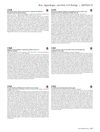 184 citations,
December 2018 in “Nature Communications”
184 citations,
December 2018 in “Nature Communications” Researchers created human hair follicles using a new method that could help treat hair loss.
 100 citations,
September 2017 in “Molecular and Cellular Endocrinology”
100 citations,
September 2017 in “Molecular and Cellular Endocrinology” Male hormones and their receptors play a key role in hair loss and skin health, with potential new treatments being explored.
 26 citations,
January 2016 in “Annals of Dermatology”
26 citations,
January 2016 in “Annals of Dermatology” Ecklonia cava polyphenols help increase human hair growth and reduce hair loss.
 19 citations,
December 2016 in “PLOS ONE”
19 citations,
December 2016 in “PLOS ONE” Early-stage skin cells help regenerate hair follicles, with proteins SDF1, MMP3, biglycan, and LTBP1 playing key roles.
6 citations,
August 2022 in “International journal of molecular sciences” α-Phellandrene may help prevent hair loss by increasing growth factors and cell growth in hair cells through a specific signaling pathway.
 1 citations,
August 2024 in “Pharmaceuticals”
1 citations,
August 2024 in “Pharmaceuticals” Goat placenta extract in a special delivery system improved hair growth and thickness in chemotherapy patients.
Combining PRP with a special lotion is more effective for hair loss than PRP alone.
 75 citations,
October 2002 in “Journal of Dermatological Science”
75 citations,
October 2002 in “Journal of Dermatological Science” Sophora flavescens extract may help hair grow by affecting growth factors and blocking a hair-related enzyme.
22 citations,
January 2011 in “Indian Journal of Dermatology/Indian journal of dermatology” Cow placenta extract may help hair grow by increasing a growth factor but is less effective than minoxidil.
 15 citations,
May 2020 in “BMC complementary medicine and therapies”
15 citations,
May 2020 in “BMC complementary medicine and therapies” Polygonum multiflorum extract helps hair grow longer and fights the effects of hormones that cause hair loss.
 3 citations,
April 2018 in “Therapeutic Delivery”
3 citations,
April 2018 in “Therapeutic Delivery” Hair follicle regeneration and delivery is complex due to many molecular and cellular factors.
 2 citations,
January 2023 in “Scientific Reports”
2 citations,
January 2023 in “Scientific Reports” HIF-1α is important for hair growth and could be a treatment target for hair loss.
 1 citations,
January 2023 in “Journal of Clinical Medicine”
1 citations,
January 2023 in “Journal of Clinical Medicine” A new hair restoration technology was found to effectively increase hair thickness, density, and growth, while reducing hair loss and improving scalp health, with no side effects.
 223 citations,
January 2014 in “International Journal of Molecular Sciences”
223 citations,
January 2014 in “International Journal of Molecular Sciences” The conclusion is that proper signaling is crucial for hair growth and development, and errors can lead to cancer or hair loss.
 149 citations,
July 2014 in “Cold Spring Harbor Perspectives in Medicine”
149 citations,
July 2014 in “Cold Spring Harbor Perspectives in Medicine” The dermal papilla is crucial for hair growth and health, and understanding it could lead to new hair loss treatments.
 95 citations,
May 2012 in “British Journal of Dermatology”
95 citations,
May 2012 in “British Journal of Dermatology” Androgens block hair growth by disrupting cell signals; targeting GSK-3 may help treat hair loss.
 15 citations,
February 2017 in “International Journal of Women's Dermatology”
15 citations,
February 2017 in “International Journal of Women's Dermatology” Hair aging and loss are caused by genetics, hormones, environment, and grooming, with treatments like minoxidil effective for certain types of hair loss.

Arabica coffee pulp extract may help prevent hair loss and promote hair growth.
 January 2023 in “Skin Pharmacology and Physiology”
January 2023 in “Skin Pharmacology and Physiology” Minor injuries to hair follicles can stimulate hair growth in mice by increasing a specific protein.
 July 2018 in “Elsevier eBooks”
July 2018 in “Elsevier eBooks” Some drugs can cause reversible hair loss, but certain chemotherapy drugs may lead to permanent hair loss; drugs can also change hair color and texture.
 April 2018 in “Journal of Investigative Dermatology”
April 2018 in “Journal of Investigative Dermatology” The research found that a specific skin cell type not only triggers hair growth but also controls hair color, and that aging can lead to hair loss and color changes.
 June 2017 in “Experimental and Therapeutic Medicine”
June 2017 in “Experimental and Therapeutic Medicine” The anti-CXCL4 antibody helps mice grow hair faster and prevents hair loss.
 47 citations,
August 2016 in “Fitoterapia”
47 citations,
August 2016 in “Fitoterapia” Some herbs and their components might help treat hair loss by affecting various biological pathways, but more research and regulation are needed.
3 citations,
September 2016 in “Clinical, cosmetic and investigational dermatology” Sphinganine can reduce hair loss and improve scalp health.
 1 citations,
October 2022 in “Annals of Translational Medicine”
1 citations,
October 2022 in “Annals of Translational Medicine” Cucurbitacin helps mice grow hair by blocking a protein that stops hair growth.
 1 citations,
March 2018 in “Hair transplant forum international”
1 citations,
March 2018 in “Hair transplant forum international” Using one's own fat may help treat hair loss.
 February 2023 in “Scientific Reports”
February 2023 in “Scientific Reports” Cold Atmospheric Microwave Plasma (CAMP) helps hair cells grow and could potentially treat hair loss.
 April 2021 in “Sohag Medical Journal”
April 2021 in “Sohag Medical Journal” Alopecia areata is an autoimmune condition causing hair loss, linked to genetic factors and immune system issues, with no cure yet.
 April 2016 in “Plastic and reconstructive surgery. Global open”
April 2016 in “Plastic and reconstructive surgery. Global open” Tafluprost could be a potential treatment for hair loss by promoting hair growth phase changes.
 159 citations,
September 2001 in “European Journal of Cancer Care”
159 citations,
September 2001 in “European Journal of Cancer Care” Chemotherapy-induced hair loss significantly affects patients' well-being, and nurses are key in helping them cope, but more research is needed to find effective treatments.


























